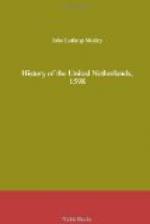was but the phantom of that ancient municipal liberty
which it had been the especial care of his father
and his great-grandfather to destroy. Most patiently
did Philip, by his steady inactivity, bring about the
decay of the last ruins of free institutions in the
peninsula. The councils and legislative assemblies
were convoked and then wearied out in waiting for
that royal assent to their propositions and transactions,
which was deferred intentionally, year after year,
and never given. Thus the time of the deputies
was consumed in accomplishing infinite nothing, until
the moment arrived when the monarch, without any violent
stroke of state, could feel safe in issuing decrees
and pragmatic edicts; thus reducing the ancient legislative
and consultative bodies to nullity, and substituting
the will of an individual for a constitutional fabric.
To criticise the expenses of government or to attempt
interference with the increase of taxation became
a sorry farce. The forms remained in certain
provinces after the life had long since fled.
Only in Arragon had the ancient privileges seemed
to defy the absolute authority of the monarch; and
it was reserved for Antonio Perez to be the cause of
their final extirpation. The grinning skulls
of the Chief Justice of that kingdom and of the boldest
and noblest advocates and defenders of the national
liberties, exposed for years in the market-place, with
the record of their death-sentence attached, informed
the Spaniards, in language which the most ignorant
could read, that the crime of defending a remnant of
human freedom and constitutional law was sure to draw
down condign punishment. It was the last time
in that age that even the ghost of extinct liberty
was destined to revisit the soil of Spain. It
mattered not that the immediate cause for pursuing
Perez was his successful amour with the king’s
Mistress, nor that the crime of which he was formally
accused was the deadly offence of Calvinism, rather
than his intrigue with the Eboli and his assassination
of Escovedo; for it was in the natural and simple
sequence of events that the last vestige of law or
freedom should be obliterated wherever Philip could
vindicate his sway. It must be admitted, too,
that the king seized this occasion to strike a decisive
blow with a promptness very different from his usual
artistic sluggishness. Rarely has a more terrible
epigram been spoken by man than the royal words which
constituted the whole trial and sentence of the Chief
Justice of Arragon, for the crime of defending the
law of his country: “You will take John
of Lanuza, and you will have his head cut off.”
This was the end of the magistrate and of the constitution
which he had defended.




